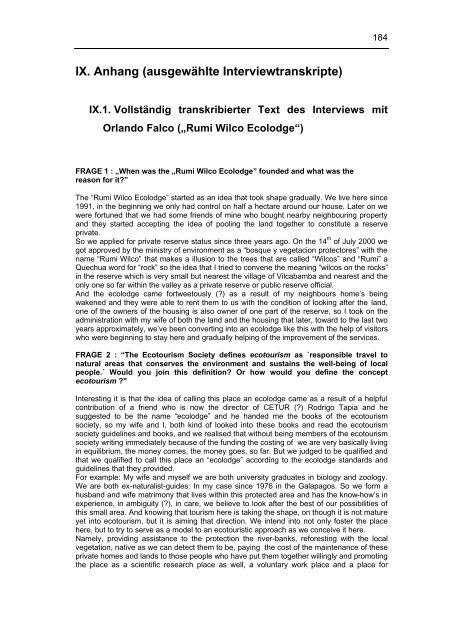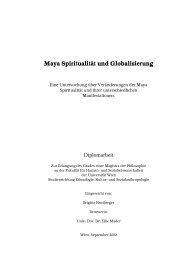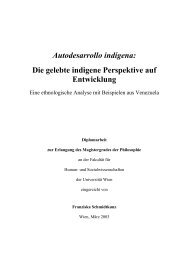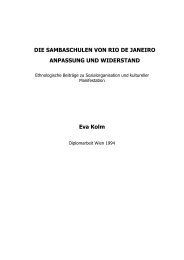Ökotourismus zwischen Sein und Schein - Lateinamerika-Studien ...
Ökotourismus zwischen Sein und Schein - Lateinamerika-Studien ...
Ökotourismus zwischen Sein und Schein - Lateinamerika-Studien ...
Erfolgreiche ePaper selbst erstellen
Machen Sie aus Ihren PDF Publikationen ein blätterbares Flipbook mit unserer einzigartigen Google optimierten e-Paper Software.
IX. Anhang (ausgewählte Interviewtranskripte)<br />
184<br />
IX.1. Vollständig transkribierter Text des Interviews mit<br />
Orlando Falco („Rumi Wilco Ecolodge“)<br />
FRAGE 1 : „When was the „Rumi Wilco Ecolodge” fo<strong>und</strong>ed and what was the<br />
reason for it?”<br />
The “Rumi Wilco Ecolodge” started as an idea that took shape gradually. We live here since<br />
1991, in the beginning we only had control on half a hectare aro<strong>und</strong> our house. Later on we<br />
were fortuned that we had some friends of mine who bought nearby neighbouring property<br />
and they started accepting the idea of pooling the land together to constitute a reserve<br />
private.<br />
So we applied for private reserve status since three years ago. On the 14 th of July 2000 we<br />
got approved by the ministry of environment as a “bosque y vegetacion protectores” with the<br />
name “Rumi Wilco” that makes a illusion to the trees that are called “Wilcos” and “Rumi” a<br />
Quechua word for “rock” so the idea that I tried to convene the meaning “wilcos on the rocks”<br />
in the reserve which is very small but nearest the village of Vilcabamba and nearest and the<br />
only one so far within the valley as a private reserve or public reserve official.<br />
And the ecolodge came fortweetously (?) as a result of my neighbours home’s being<br />
wakened and they were able to rent them to us with the condition of looking after the land,<br />
one of the owners of the housing is also owner of one part of the reserve, so I took on the<br />
administration with my wife of both the land and the housing that later, toward to the last two<br />
years approximately, we’ve been converting into an ecolodge like this with the help of visitors<br />
who were beginning to stay here and gradually helping of the improvement of the services.<br />
FRAGE 2 : “The Ecotourism Society defines ecotourism as `responsible travel to<br />
natural areas that conserves the environment and sustains the well-being of local<br />
people.´ Would you join this definition? Or how would you define the concept<br />
ecotourism ?"<br />
Interesting it is that the idea of calling this place an ecolodge came as a result of a helpful<br />
contribution of a friend who is now the director of CETUR (?) Rodrigo Tapia and he<br />
suggested to be the name “ecolodge” and he handed me the books of the ecotourism<br />
society, so my wife and I, both kind of looked into these books and read the ecotourism<br />
society guidelines and books, and we realised that without being members of the ecotourism<br />
society writing immediately because of the f<strong>und</strong>ing the costing of we are very basically living<br />
in equilibrium, the money comes, the money goes, so far. But we judged to be qualified and<br />
that we qualified to call this place an “ecolodge” according to the ecolodge standards and<br />
guidelines that they provided.<br />
For example: My wife and myself we are both university graduates in biology and zoology.<br />
We are both ex-naturalist-guides: In my case since 1976 in the Galapagos. So we form a<br />
husband and wife matrimony that lives within this protected area and has the know-how’s in<br />
experience, in ambiguity (?), in care, we believe to look after the best of our possibilities of<br />
this small area. And knowing that tourism here is taking the shape, on though it is not mature<br />
yet into ecotourism, but it is aiming that direction. We intend into not only foster the place<br />
here, but to try to serve as a model to an ecotouristic approach as we conceive it here.<br />
Namely, providing assistance to the protection the river-banks, reforesting with the local<br />
vegetation, native as we can detect them to be, paying the cost of the maintenance of these<br />
private homes and lands to those people who have put them together willingly and promoting<br />
the place as a scientific research place as well, a voluntary work place and a place for





